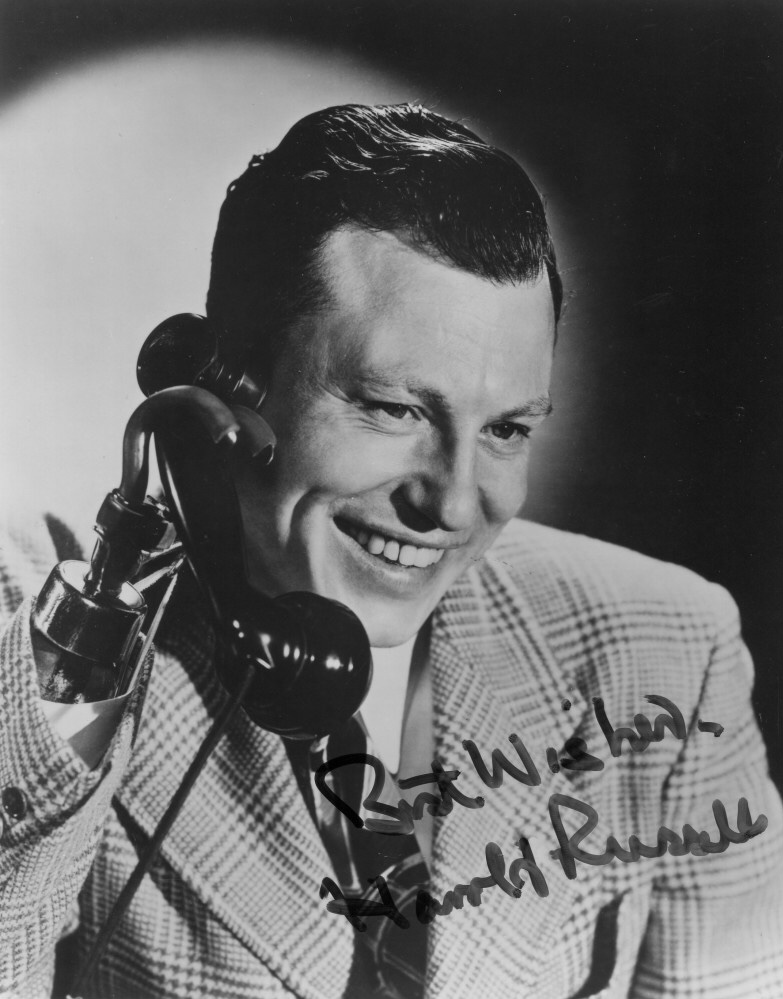
Harold Russell was born in Nova Scotia, Canada in 1914. He moved with his family to the U.S. in 1933. He served in the Army in World War Two and lost both of his hands in conflict. William Wyler cast him in a film about returning soldiers “The Best Year of Our Lives” in 1946 and he won an Oscar for his affecting performance opposite Cathy O’Donnell. His only other film was “Inside Moves” in 1980. He died in 2002 at the age of 88.
His “Guardian” obituary:
The ironic title of William Wyler’s multiple Oscar-winning film, The Best Years Of Our Lives (1946), refers to the fact that many servicemen had “the best years of their lives” in wartime. The picture focused on three second world war veterans returning to civilian life with severe disabilities. One of them, Homer Parrish, a young sailor, has had both hands, lost in combat, replaced with articulated hooks. The fact that Homer was played by Harold Russell, whose own hands were amputated after a wartime injury – and replaced with steel hooks – added to the poignancy of the performance.
As Homer, the boyish-looking Russell, who has died aged 88, revealed remarkable dexterity – he lifts a cigarette from a pack with his prosthetics, strikes a match and lights his companions’ cigarettes. “Boy, you ought to see me open a bottle of beer,” he boasts.
But he expresses fear and uncertainty about returning to his girlfriend. “I can dial telephones, I can drive a car, I can even put nickels in the jukebox. But Wilma’s only a kid. She’s never seen anything like these hooks.” As his friend remarks, “The navy couldn’t train him to put his arms around his girl to stroke her hair.”
In the justly celebrated sequence of Homer’s homecoming, he stands with his hands by his sides as Wilma hugs him. After overcoming many obstacles, the couple get married; she clasping his right hook during the ceremony, he skillfully sliding the ring onto her finger.
The role won Russell two Oscars, one for best supporting actor and a special second for “bringing aid and comfort to disabled veterans through the medium of motion pictures”, making him the only person in academy history to win two awards for the same role. In August 1992, he created controversy by auctioning the best supporting actor statuette for $60,500 to an anonymous buyer, claiming that he needed the money for his wife’s medical bills. In response to criticism, he said: “My wife’s health is much more important than sentimental reasons.”
Russell, who was born in Nova Scotia, but moved to Cambridge, Massachusetts, was working in a food market when Pearl Harbour was bombed. “I made a rush to the recruiting office, not out of patriotism but because I thought of myself a failure,” he explained in his autobiography, Victory In My Hands (1949). He became a demolition expert, and it was while teaching recruits that a defective fuse detonated TNT that he was holding. After choosing steel hooks rather than plastic hands, he became so adept at using them that he featured in a US army training film, Diary Of A Sergeant, made for soldiers who had lost both hands.
Wyler saw the film and, although Russell had no lines, cast him in The Best Years of Our Lives. Russell, who was then attending business school at Boston University, got $250 a week, and $100 a week for living expenses. After the movie became a box-office hit, the producer Sam Goldwyn gave him a weekly bonus of $120 for a year, asking that he make promotional tours. On Wyler’s advice, he then went back to college, “because there wasn’t much call for a guy with no hands in the motion picture industry”.
After graduating, Russell started a public relations business, but spent most of his time campaigning for the disabled, his main message being, “It’s not what you lost, but what you have left and how you use it.” He would joke that he could pick up anything with his hands except “a dinner cheque”.
In 1961, President Kennedy appointed Russell as vice chairman of the presidential committee on employment of disabled people. In 1964, Lyndon Johnson made him chairman, and Richard Nixon reappointed him. He briefly returned to acting, in Inside Moves (1980), about disabled people who meet in a bar to help each other, and in Dogtown (1997), where he played a cigar-store owner and war veteran. He also appeared in the Vietnam war television series, China Beach.
He is survived by a son and a daughter.
· Harold Russell, actor and campaigner, born January 14 1914; died January 29 2002
The above “Guardian” obituart can also be accessed online here.

